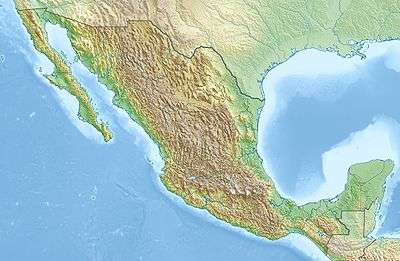Sierra la Primavera
Sierra la Primavera is a Late Pleistocene volcanic centre in Jalisco of central-western Mexico, located immediately west of Guadalajara. It consists of a caldera, lava domes and lava flows that have formed in the last 200,000 years, with the latest known volcanic eruption having occurred about 30,000 years ago.
| Sierra la Primavera | |
|---|---|
 Sierra la Primavera Location in Mexico | |
| Highest point | |
| Elevation | 2,270 m (7,450 ft) |
| Coordinates | 20.62°N 103.52°W |
| Geography | |
| Location | Jalisco, Mexico |
| Geology | |
| Age of rock | Pleistocene |
| Volcanic arc/belt | Trans-Mexican Volcanic Belt |
Geology
The formation of Sierra la Primavera commenced about 120,000 years ago with the eruption of rhyolitic flows and domes. This was followed by a VEI-6 eruption about 95,000 years ago that deposited 20 km3 (4.8 cu mi) of tephra with the creation of an 11 km (6.8 mi) wide caldera.[1] The tephra forms a volcanic deposit known as the Tala Tuff and consists of volumnous pumice flows.[2][1]
Subsequent filling of the caldera with water resulted in the formation of a lake through which several lava domes were created. A series of lava domes were emplaced along the caldera about 95,000 years ago, which was followed by the eruption of a younger series of ring domes about 75,000 years ago.[1]
After uplift and sedimentation filled the lake, a final series of lava domes were erupted along the southern margin of the caldera about 60,000 to 30,000 years ago. Although volcanic eruptions are not known to have occurred from Sierra la Primavera in recorded history, it is still potentially active, containing a series of fumaroles and hot springs.[1]
Subfeatures
Sierra la Primavera contains 29 named subfeatures:[1]
| Name | Type | Coordinates |
|---|---|---|
| Cerro Alto | Dome | 20°42′0″N 103°32′0″W |
| Arroyo Colorado | Dome | 20°35′0″N 103°30′0″W |
| Arroyo Ixtahuatonte | Dome | 20°38′0″N 103°30′0″W |
| Arroyo la Cuartilla | Dome | 20°43′0″N 103°31′0″W |
| Arroyo las Animas | Dome | 20°37′0″N 103°35′0″W |
| Arroyo los Pilas | Dome | 20°39′0″N 103°29′0″W |
| Arroyo Saucillo | Vent | 20°32′0″N 103°33′0″W |
| Cañón de las Flores | Vent | 20°42′0″N 103°35′0″W |
| Cerro el Chapulín | Dome | 20°41′0″N 103°29′0″W |
| Cerro Chato | Dome | 20°42′0″N 103°34′0″W |
| Cerro el Colli | Dome | 20°39′0″N 103°28′0″W |
| Cerro la Cuesta | Dome | 20°37′0″N 103°30′0″W |
| Cerro el Culebreado | Dome | 20°37′0″N 103°33′0″W |
| Dos Coyotes | Dome | 20°40′0″N 103°29′0″W |
| Llano Grande | Vent | 20°35′0″N 103°36′0″W |
| El Madrón | Dome | 20°37′0″N 103°31′0″W |
| Mesa el Burro | Dome | 20°43′0″N 103°35′0″W |
| Mesa el Chiquihuitillo | Dome | 20°43′0″N 103°36′0″W |
| Mesa el León | Dome | 20°41′0″N 103°36′0″W |
| Mesa el Najahuete | Dome | 20°40′0″N 103°31′0″W |
| Mesa la Lobera | Dome | 20°43′0″N 103°30′0″W |
| Cerro el Pedernal | Dome | 20°40′0″N 103°35′0″W |
| Pinar de la Venta | Dome | 20°43′0″N 103°25′0″W |
| Cerro las Planillas | Vent | 20°35′0″N 103°33′0″W |
| La Puerta | Dome | 20°37′0″N 103°35′0″W |
| Río Salado | Dome | 20°41′0″N 103°35′0″W |
| Cerro San Miguel | Vent | 20°36′0″N 103°36′0″W |
| Cerro el Tajo | Vent | 20°36′0″N 103°29′0″W |
| Cerro el Tule | Dome | 20°38′0″N 103°32′0″W |
See also
References
- "Sierra la Primavera". Global Volcanism Program. Smithsonian Institution. Retrieved 2020-03-13.
- Ceballos, Giovanni Sosa; Vázquez, José Luis Macías; Cruz, Diego Miguel (2016), "IAVCEI Commission on Volcano Geology 3rd International Workshop, Etna-Aeolian Islands" (PDF), Petrology of La Primavera caldera magmas; the Tala Tuff case study, p. 50